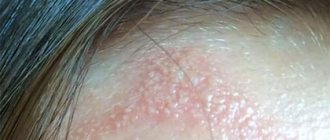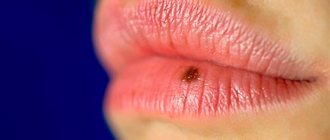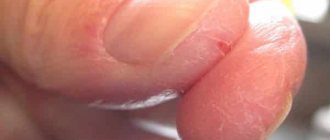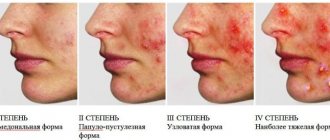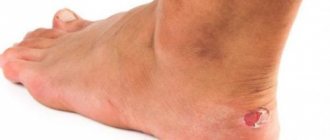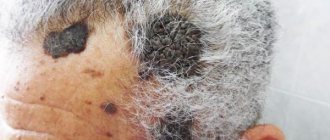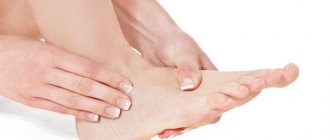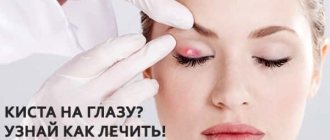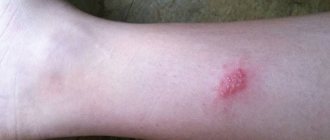Herpes in the intimate area is diagnosed in 30% of adults.
However, many are embarrassed by the disease and do not immediately seek medical help, thinking that the symptoms will go away on their own. But this is a misconception. Delayed treatment can lead to serious complications. Having penetrated the body, viral particles primarily affect the skin. However, other manifestations may occur, for example, stagnation of urine, infertility. Herpes can also affect the nervous system and lead to depression.
Herpes pubis is similar in appearance to a sexually transmitted disease. A person begins to take medications for venereology treatment, because... shy and afraid of the opinions of others. However, such therapy will not bring a positive result, but will only worsen the situation. Treatment should only be prescribed by a qualified physician.
Reasons for the development of herpes
Genital herpes is a contagious viral disease that affects the mucous membranes and skin of the human genital organs. The HSV type 2 virus, which belongs to the venereological group, is responsible for genital herpes. Entering the human body for the first time, the herpes virus is introduced into the genetic apparatus and remains there forever.
The risk group includes young people aged 18–35 years.
The disease is extremely common. Millions of people on our planet are carriers of the herpes virus in an inactive form. When general immunity decreases due to weakening of the body by hypothermia, illness, physical overload or stressful situations, the virus is activated. The viral disease becomes acute. In infected young people with sufficiently strong immunity, exacerbation of genital herpes occurs once every 3 years.
The main causes of genital herpes should be listed. These include:
- promiscuity;
- lack of means of protection during sexual intercourse;
- lack of personal hygiene;
- use of common items;
- infection of a pregnant woman.
The following are considered common ways of spreading the virus:
- sexual (genital, anal, oral);
- perinatal (from an infected mother to a newborn);
- household (contact and non-contact);
- inoculation (self-infection - independent transfer of infection to the genitals).
The genital herpes virus lives outside the human body for a very short time, so infection by airborne droplets is practically excluded.
How to treat genital herpes?
People think about starting treatment for genital herpes when pimples filled with white liquid appear on the pubic area.
This approach to your own body is wrong. If you do not start treating the virus in a timely manner, you can catch an infection, which will cause complications on the skin (trophic ulcers, lichen), and in some cases can harm internal organs.
Therefore, as soon as you notice acne on the pubic area or the skin next to it, you need to go to the doctor. He will prescribe tests that will help determine the type of virus and create an effective treatment plan.
Most often, women and men with herpes are prescribed the following medications:
- immunomodulators;
- substances that suppress the manifestations of the virus;
- vitamins.
Antiviral drugs can be prescribed in tablet form and in the form of ointments. It is most effective to combine them for treating the skin of the genital organs.
Drugs to enhance immunity will prevent further spread of the virus and infections in the body.
Some patients are advised to treat virus-affected areas with antibacterial drugs and healing oils (sea buckthorn, fir, juniper oil) as auxiliary measures.
After completing the course of treatment, care must be taken to ensure that herpes does not reappear. To do this, you should strengthen your immune system, avoid casual sex, and promptly treat all infections that develop in the body.
Maintaining personal hygiene is important. Try not to expose your body to stress.
Herpes in the intimate area in women: symptoms
If genital herpes occurs in a woman (see photo), the symptoms will be more pronounced. Significant pain is felt, the labia majora and minora swell greatly. Herpes in the intimate area in women spreads to the vulva, and then moves along the urinary canal and causes urethritis. Progress along the genitalia in the most difficult cases leads to infection of the cervix and the uterus itself, and the development of infertility. The rashes will be painful on the inner thighs, in the perineum, and around the anus.
Women are more susceptible to infection because they have a larger external area of mucous membranes and a wider urinary canal. They experience severe pain and relapse more often.
With an exacerbation of herpes in intimate places in women, blood may be released from the genital tract during sexual intercourse. If the urethra is infected, pus appears in the urine.
Herpes during pregnancy
The disease, however, poses a serious danger during pregnancy, since there is a high probability of the virus entering the fetus either during pregnancy itself or during childbirth. Herpetic infection is very dangerous for a newborn and can lead to his death or serious eye damage. If the risk of infection of the baby during childbirth is very high, then a caesarean section has to be resorted to. The situation is complicated by the fact that the ingestion of antiviral drugs in the first trimester of pregnancy is prohibited.
Herpes during pregnancy
The most dangerous infection is in the first and last trimester of pregnancy. The disease poses a serious danger to the fetus, as it can provoke a frozen pregnancy, spontaneous miscarriage, premature birth, or the appearance of a baby with congenital anomalies.
When it passes through the birth canal, the disease is transmitted to the child from the infected mother. If an atypical form of the virus is present, examinations are carried out regularly during the last 6 months of pregnancy. To do this, from women with rashes on the pubic part, secretions from the cervical canal are taken and tested for the presence of HSV antigen. If necessary, a caesarean section is performed.
What is the danger? Possible complications
The psychosomatics of herpes is such that the consequences of the disease can negatively affect a person’s mental health. The patient experiences severe mental discomfort; he often experiences depression, nervous breakdowns, alternating with apathy.
Physiologically, herpes is fraught with:
- the formation of bleeding cracks in the mucous membrane of the genitals and anus. In addition to pain, this interferes with normal sex life, causing problems in the family;
- severe pain in the lower abdomen, which occurs due to herpes damage to the peripheral nervous system. Pain may radiate to the perineum and rectum;
- decreased immunity as a result of constant relapses. Because of this, the body becomes defenseless against other infections;
- in men – the occurrence of urethritis, prostatitis, cystitis;
- damage to the nervous system - the development of encephalitis, meningitis;
- decreased libido, which provokes difficulties in relationships with the opposite sex.
Particularly severe consequences of the disease are neonatal herpes, which occurs if the child becomes infected during the mother’s pregnancy or during childbirth.
A dangerous disease can lead to the death of the baby or the development of complex neurological disorders, liver damage, and heart disease.
PUBIC ACNE OR HERPES?
Some women think that they have herpes type 2 when they discover acne in their pubic area.
To determine the nature of pubic acne, you must consult a doctor.
But they are not always manifestations of the disease. Some women have very sensitive genital skin, so all hair removal procedures can cause acne.
The appearance of rashes may be associated with hormonal instability. In such circumstances, you should consult a doctor.
When pulling out excess vegetation, the upper layers of the skin are damaged. Because of this, the hair grows in, and many red pimples form on the surface.
When pressed, a white liquid may come out, which impressionable women confuse with manifestations of herpes.
In reality, it is pus that accumulates near the inflamed hair follicle.
Using rough scrubs and changing your hair removal method will help prevent the appearance of such acne.
Diagnostics
Making a diagnosis in a typical course is not difficult for an experienced specialist - based on collecting an anamnesis and examining the affected areas. However, in most cases, the pathology occurs without a characteristic clinical picture. Patients may complain of hyperemia of the skin of the genital organs, painful cracks, itching without the formation of papules with liquid.
Then a number of laboratory methods are used to determine the genital disease. The material used is any human biological fluid (urine, blood, saliva, tear fluid, sperm). A scraping is taken from the mucous membrane of the urethra or cervical canal, vagina, and cervix.
Laboratory methods - bacteriological culture, direct immunofluorescence (DIF), polymerase chain reaction (PCR), enzyme-linked immunosorbent assay (ELISA).
Studies such as colposcopy, immunogram, glycoprotein immunospot G-specific HSV test can also be used.
Clinical picture
When the herpes virus (HSV-2) enters the body, it begins to actively multiply. The first symptoms may not be noticed immediately; the incubation period lasts from several days to weeks, it all depends on how strong the immune system is.
The symptoms of the initial appearance of herpes on the pubis in both sexes are almost identical: the skin becomes red, swollen, itching and burning appear. At first, the signs can be confused with the manifestation of thrush, but unlike it, with pubic herpes there is no curdled discharge. Subsequently, bubbles filled with clear liquid appear. After 2-5 days they burst, ulcers form on the skin, which are covered with a yellowish crust.
An atypical form of genital herpes, characterized by a short-term course, is considered dangerous for humans. It affects the pubis, progressing in women to the uterus and appendages, and in men to the seminal vesicles and prostate.
In the absence of permanent mechanical damage, the ulcers heal without scars.
Penetration of the herpes virus along the genitourinary system provokes damage to the bladder and urethral canal, signs of urination disorder and streaks of blood in the urine are observed.
Characteristic symptoms: itching, burning, the appearance of leucorrhoea, almost untreatable. With the atypical form of genital herpes, there is practically no rash, swelling, or hyperemia on the pubis and other parts of the genital organs.
In men, rashes of varying intensity are observed on the glans penis, affecting the foreskin, and less commonly, the shaft of the phallus. In women, the rashes are localized on the pubis, outer and inner labia, buttocks, in the anus, and inner thighs.
Characteristic clinical symptoms: itching, burning on the pubis before the appearance of blisters filled with translucent liquid.
Associated symptoms:
- aching pain in the pubic area and external genitalia;
- discomfort when urinating;
- symptoms of general malaise (weakness, muscle pain, aches, feeling of weakness);
- heat;
- enlarged inguinal lymph nodes.
The latter signs are characteristic of the acute course of genital herpes or in cases where the disease does not go away for 2 weeks or more.
How and with what to treat herpes in the intimate area?
In men and women, treatment of herpes at home should begin with the cessation of sexual intercourse. It is in the acute stage, when rashes appear, that the disease is transmitted to the partner with almost one hundred percent probability.
The treatment regimen is prescribed by the doctor, it may include:
- Antiviral therapy.
- Use of local medications (creams, ointments, lotions).
- Taking medications to strengthen the immune system.
- Traditional methods of treatment as a complement to traditional medical procedures.
Modern medicine is not yet able to help completely get rid of herpes, but comprehensive measures will help to resist the virus as much as possible and alleviate the patient’s condition.
The full course of therapy, starting with treatment of the acute stage, may take about 3 months. If you follow all the doctor’s recommendations, you can ensure that the virus “goes into hibernation” and relapses will be rare.
Preventive actions
To prevent infection with the virus, you must follow a few simple recommendations:
- observe basic rules of personal and general hygiene,
- do not engage in any sexual contact with people who may be infected with the virus,
- be sure to use a condom during intimacy, refrain from frequently changing sexual partners,
- take care of strengthening the immune system, eat right, drink vitamins periodically, take immunomodulators if necessary,
- maintain a healthy lifestyle, devote time to moderate physical activity, get adequate rest,
- give up bad habits: drinking alcohol, smoking.
Compliance with these rules will help prevent infection with the herpes virus, strengthen the body's protective functions, and improve well-being.
Tablets for internal use
All tablet drugs can be divided into several groups: antiherpes, immunomodulators and agents for suppressing viral activity. At the same time, antiherpetic drugs have the most effective properties, the rest are used as auxiliary ways to get rid of herpes in intimate places.
Antiherpes prevent the spread of virions, virus particles, and therefore further development of the disease is blocked. The course and dosage are selected based on the severity of the disease and the characteristics of the body:
- Treatment with Acyclovir and its analogues: Zovirax, Virolex. Taken according to the following regimen: 200 mg per dose, 5 times a day.
- Therapy with Valaciclovir and its analogues: Valtrex, Virdel. 500 mg morning and evening.
- Prescription of Famciclovir and its derivatives: Famvir, Famacivir 250 mg 3 times a day.
To suppress the activity of the virus while simultaneously increasing the body's defenses, interferon therapy is used. Such means include:
- "Amiksin".
- "Arbidol".
- "Cycloferon".
- "Lavomax".
- "Tilaxin".
Immunomodulators are used to stimulate the immune system by accelerating the maturation of blood leukocytes:
- "Galavit."
- "Isoprinosine."
- "Groprinosin".
- "Levamisole."
Panavir is considered a broad-spectrum drug; this drug is used for various types of herpetic infections. Strengthens resistance to infections, protects against viruses. It is administered intravenously. Made from potato shoots.
Treatment of pubic rash
For herpes virus therapy to be effective, treatment should begin immediately after the first manifestations of the disease, in the early stages of the development of the disease. To make a diagnosis, the doctor uses the polymerase chain reaction technique. This test allows you to quickly determine the DNA of the herpes virus.
To accurately determine the species of the microbe, liquid is taken from the bubbles for research. Based on the results of laboratory tests, the doctor makes a diagnosis and prescribes a treatment regimen.
The goal of therapy is to stop the development of the virus and strengthen the patient’s immunity. Only a doctor should prescribe medications to treat the pubic form of the disease.
Immunomax for intramuscular administration
The duration of treatment is usually 2 weeks. Herpes pubis is more often diagnosed among women. First of all, antiviral drugs are prescribed to suppress the virus.
Antiviral drugs can be prescribed in tablet form or in the form of ointments and creams. The use of ointments helps to quickly get rid of rashes, as well as prevent the spread of the virus to nearby areas of the skin.
The following drugs are usually used for treatment:
- Acyclovir;
- Valacyclovir;
- Famciclovir.
The above products also have a wound-healing effect, thereby leading to the restoration of the skin. If the herpes virus occurs periodically, and the drug used has become ineffective, then perhaps an addiction to the ointment has occurred and the drug needs to be changed. The drug Herpferon, containing interferon and lidocaine, has proven itself well. Treatment products should be applied to the affected skin, washed with soap and wiped dry. Local products are applied in a thin layer about 5 times a day.
After using medications, you should wash your hands thoroughly.
The average duration of treatment is a week. Any cream should not be used for more than 10 days.
In addition, for the treatment of pubic virus in women, immunomodulators are prescribed to strengthen the immune system:
- Stimulators of interferon production: vitamin B12, Prodigiozan, Kagocel, Levamisole, Arbidol, Amiksin.
- Interferons. These medications activate the body's defenses. The most common medications are: Kipferon and Viferon.
- Immunoglobulins. These medications are prescribed to patients with a generalized type of disease.
Doctors also recommend taking Thymogen, Timalin and Myelopid.
In addition, taking medications to boost immunity can reduce the risk of new infections, since the body will be able to fight the virus on its own.
The effectiveness of therapy primarily depends on the timely diagnosis of the virus.
Treatment of herpes in men is carried out according to the same scheme as in women. Based on the test results, the doctor selects an individual treatment regimen, the effectiveness of which depends on the patient’s age, the state of his immunity, the presence of bad habits, and living conditions.
The absence or untimely treatment of the virus in men can provoke the development of complications in the form of diseases of the prostate, eyes and nervous system.
Ointments and creams for the treatment of herpes
For external treatment, doctors recommend home treatments for intimate zone herpes with local antiviral agents. Their action is local, accelerates the process of natural healing of injured tissues, relieves severe itching and burning, swelling and hyperemia of the skin.
Here are the most effective and inexpensive ointments, as well as creams for herpes in intimate areas:
- Acyclovir. The active component of the same name specifically affects the focus of pathology, destroys pathogenic flora and accelerates tissue regeneration after treatment of the intimate area. It is recommended to apply the ointment in case of relapses up to 3-4 times a day, until the symptoms disappear completely. Advantages - the drug is not absorbed into the systemic circulation, productive treatment during pregnancy with Acyclovir is possible.
- Panavir. The active components are plant glycosides extracted from young potato shoots. The cream is approved during pregnancy and does not cause addiction. The medicine can be applied to the intimate area up to 5 – 6 times. Advantages: no addictive effect, convenient use.
- Zovirax. Effectively treats herpes when applied externally. Course – up to 10 days. Zovirax is prescribed for treating intimate areas up to 5 – 6 times a day. Advantages: gentle action, affordable price.
- Herpferon. The combined drug contains interferon, acyclovir, and lidocaine in its chemical composition. The medication effectively relieves vaginal pain, itching and burning. An ointment is recommended for exacerbations to relieve acute pain. It is allowed to use the medicine up to 5 – 6 times a day. Advantages: no addictive effect, possibility of treatment during pregnancy.
It is important to understand that the pathogenic infection is sexually transmitted. Therefore, effective treatment begins with temporary abstinence from sexual intercourse and taking pills. In the future, to treat the blisters and relieve redness, medicinal creams and gels are additionally used, which are used to treat the groin area up to 5–6 times a day. It is not possible to completely cure a characteristic illness in this way, but positive dynamics as part of combination therapy are ensured.
Causes of the disease and risk factors
Herpes on the pubis is transmitted only through sexual contact; a household variant is not possible. The disease can be contracted through any sexual relationship with a virus carrier: traditional, oral-genital, anogenital.
The following factors contribute to infection:
- sexual contacts with constant change of partners,
- homosexual relationships,
- lack of vitamins in the body,
- weakened immunity,
- regular mental and physical overload,
- use of intrauterine devices,
- overwork,
- abortions with uterine curettage,
- the presence of other infections, general and genital,
- hypothermia,
- climate change.
Risk factors contribute to infection and active progression of the disease.
Candles
Candles for herpes in intimate places have a good healing effect. They have a good immunostimulating and antiviral effect. Thanks to the rapid dissolution and penetration of the active substances into the blood vessels, the therapeutic effect becomes noticeable very quickly. Most often, suppositories for herpes are prescribed to pediatric patients. The most popular products in this group, which can be purchased at the pharmacy, are:
- Viferon.
- Panavir.
- Hexicon.
- Genferon.
- Betadine suppositories.
- Galavit.
- Kipferon.
During a relapse of a viral infection, doctors most often prescribe Polyoxidonium suppositories.
Treatment of genital herpes in men
A complete cure for the herpes virus is impossible, but it is also impossible to do without treatment. Only a qualified specialist can tell you how to treat genital herpes in men.
Correctly prescribed treatment for genital herpes in men infected with it reduces the risk of relapses, complications and facilitates the course of the disease itself.
Depending on the form of genital herpes in men, the nature of its course and the individual characteristics of the patient, the doctor may prescribe antiviral drugs such as Acyclovir, Valaciclovir or Famciclovir in tablets, as well as Panavir intravenously.
All these drugs block the development of genital herpes, reducing the severity of its symptoms. The dosage is selected individually.
Dosage adjustment is required in cases of kidney and liver diseases, and the treatment of elderly and black people with these drugs also has its own characteristics, which once again suggests that it is forbidden to prescribe treatment for yourself.
To relieve discomfort in the area of genital herpes rashes, Panavir gel and Zovirax ointment should be applied. If the pain is severe, sedatives, colloidal soap and oatmeal-based bath decoctions are used.
Taking hot baths also helps reduce the activity of rashes. Ice is applied to the genital area, but you should be careful with this to avoid frostbite. The time of such a lotion should not exceed 10-15 minutes.
You should also avoid wearing tight underwear during treatment, as it irritates herpes lesions on the genitals of men, increasing discomfort. And during the healing stage of ulcers, friction against tissue can provoke bacterial infection of open wounds.
Traditional methods
There are several homemade mixtures to choose from:
- St. John's wort, from which an ointment is made that relieves symptoms during exacerbation of the disease. The plant is crushed and 5 tablespoons are combined with 500 ml of sunflower oil. After a month of infusion and straining, local treatments are carried out.
- Licorice is used for internal use. The recipe for the decoction is quite simple - pour 2 tablespoons of crushed root into a glass of boiling water and put on fire, cook for a quarter of an hour. Then the product is cooled, passed through a sieve and drunk 50 ml 2-3 times a day. You can make local lotions using cotton pads soaked in liquid.
- Citrus essential oil, tea tree or bergamot product are mixed with medicinal ointments, creams (two drops are enough) to enhance the disinfectant, antiseptic effect, and inhibit the virus.
It should be clearly understood that it is impossible to cure herpes using these recipes. They will help only as symptomatic treatment.
Other reasons
Pubic blisters come in many different forms. Some are small in size and have liquid contents inside, others are dense to the touch, practically indistinguishable from the rest of the skin, some itch and itch, others do not cause any discomfort. All of these characteristics depend on what caused the blisters.
Meanwhile, the causes can be both infectious and non-infectious in nature. The simplest and least dangerous cause is skin irritation caused, for example, by epilation or friction against hard nylon underwear. This reaction goes away on its own after a couple of days, if during this time the pubic skin is kept in comfortable conditions.
Excessive sweating and allergic reactions can also cause the formation of blisters on the pubic area. As for diseases accompanied by such a skin reaction, these include:
- Genital herpes. A viral disease transmitted by contact with an infected person. It appears as blisters on the skin. They are most often multiple in nature, located close to each other, due to which a spot is formed, consisting of several bubbles with liquid contents. Such spots can appear in any part of the body, including the pubis.
- Athlete's foot. A fungal disease that affects the skin mainly in the area of large folds - in the groin, armpits, under the breasts. In the absence of treatment or if the established regimen is not followed, it can spread to nearby areas of the skin. Therefore, the focus of the disease formed in the groin can spread to the inner thighs, scrotum, and pubis. Symptoms include red spots with a clearly defined border, on the surface of which small blisters may be observed.
- Molluscum contagiosum. Resembles small hemispherical blisters. They match the color of the rest of the skin. The size ranges from 1 to 5 mm in diameter. Painless, filled with serous contents. The disease is viral in nature and spreads rapidly. Education data must be deleted.
Dietary recommendations
For a speedy recovery from intimate herpes, the list of prohibited products includes:
- Any semi-finished products, sausages.
- Canned food.
- Store-bought ice cream, cheese, yogurt.
- Bagged teas.
- Particularly spicy seasonings.
- Corn flakes with the addition of barley molasses.
- Artificial seafood.
- Candies based on chocolate, soy, caramel, store-bought jam.
- Kvass.
The menu consists of the following items:
- Vegetable or cereal soups.
- Rice, corn, millet, buckwheat porridge. They can be prepared with milk.
- Dairy products.
- Hard-boiled eggs, steam omelet.
- Boiled or baked meat.
- Berries, fruits and vegetables served in any form.
- Weakly brewed teas, jelly.
- Honey.
- Butter and vegetable oils.
- Gluten free pasta.
Atypical forms of genital herpes
In some cases, herpes may be atypical. In this case, it is divided into four main forms.
- erythematous : pronounced inflammation, itching and pain, fever;
- bullous : the main discomfort occurs when ulcers form after the vesicles mature;
- hemorrhagic : hemorrhages in the area where the rash is localized, the internal mucous membranes in the anus and urethra are especially susceptible to this;
- itchy : even in the absence of blisters, which happens often in this form, there is a strong burning sensation in the groin and on the skin of the genitals.
Women are more susceptible to atypical forms of genital herpes than men. Moreover, these types of herpes are the most difficult to diagnose, which delays the start of treatment.
Sometimes the symptoms of herpes in men can be confused with the onset of colds, food poisoning, rectal diseases, allergies and skin lesions with staphylococcus or streptococcus. In any case, it is dangerous to delay a visit to a specialist.
Herpes in the groin in men symptoms photo
Prevention
The prevalence of the virus does not mean that you should not protect yourself from contracting the infection. In fact, genital herpes is one of the sexually transmitted diseases and is transmitted mainly during intimacy. It should be remembered that barrier contraceptives, although they reduce the likelihood of infection, nevertheless do not make it zero. Therefore, the surest way to protect yourself from infection is to have one permanent partner. It should be noted that there are prophylactic agents to protect against infection with herpes during sexual intercourse, such as Betadine and Panavir. However, they have some contraindications and also do not provide a 100% guarantee.
It must be remembered that the virus can also be found on other skin surfaces, on the lips and face. Therefore, you should minimize contact with other people and especially children - hugs, kisses, handshakes. We should not forget about the household route of infection, so you should not use hygiene products (towels, etc.) shared with other people if you do not know for sure whether these people are infected with the virus or not.
In the same case, if the virus is already present in the body, then this person needs to take measures to prevent the development of relapses of the disease. These include constant strengthening of the immune system, treatment of concomitant infections, a healthy lifestyle, good nutrition and a minimum of stress.
Symptoms of pathology
The main sign of herpes is characteristic rashes in intimate places.
A rash appears on the skin with the following features:
- small bubbles filled with liquid
- unbearable itching and burning,
- gradual clouding and bursting of pimples,
- the formation of ulcers that crust over over time.
Such manifestations look very unpleasant. After 2-3 weeks, the signs of the disease completely disappear.
Often, patients pay attention to herpes only after the appearance of rashes, but this symptom indicates the active reproduction of the virus. It is much easier to get rid of pathology in the early stages, before bubbles appear. Primary signs include:
- discomfort in the perineal area: inflammation, itching, swelling,
- increase in body temperature to 39 degrees,
- nausea, dizziness, fatigue,
- Uncharacteristic discharge from the genitals: mucous, copious.
Pimples on the pubis are not the only danger of pathology. If left untreated, the rash spreads to nearby areas of the body or penetrates the genitourinary system.

